Dengue Fever: Menace to the Mankind
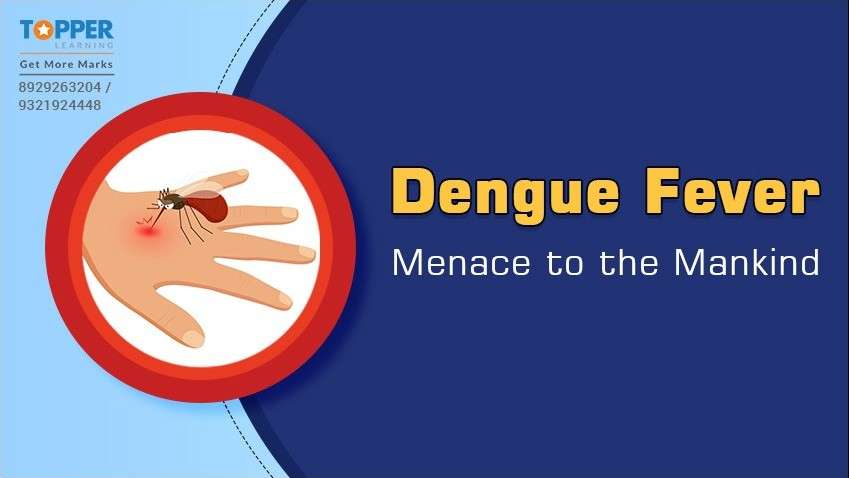
Dengue virus spreads among humans through infected mosquito bites. Everyone should know the symptoms, causes and preventions of dengue fever. Let’s understand this dangerous disease through this article.
By Topperlearning Expert 06th Oct, 2023 | 06:55 pm
ShareIn India, the number of dengue cases has gradually increased in the last 50 years. The first proven epidemic outbreak transpired in the year 1963-64. The adverse effects of dengue are a menace to mankind, as dengue fever is still lingering around India, with a number of cases being reported frequently.
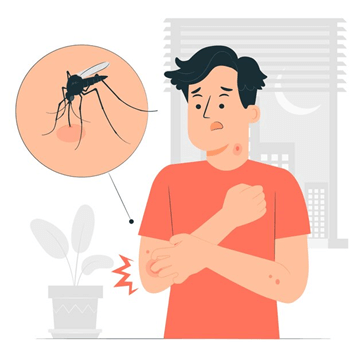
Let’s understand the causes, symptoms, and preventive measures of dengue through this blog.
What is Dengue?
Dengue, also known as break-bone fever, is a mosquito-borne disease. Dengue fever in humans is caused by the bite of infected mosquitoes carrying one of the four variants of dengue virus (DENV). Dengue is a non-contagious disease. It is not transmitted from one person to another by contact. But, if a pregnant woman gets infected with dengue, the infant might get the infection.
The dengue fever symptoms are similar to the flu but can be life life-threatening if a person gets diagnosed with Dengue hemorrhagic fever (DHF).
Cause and Life Cycle of Dengue Fever
Dengue fever is a severe illness caused by mosquitoes, especially Aedes aegypti (female mosquitoes). It has four stages: egg, larva, pupa, and adult. It happens when mosquitoes get infected by one of the four variants of the dengue virus.
These mosquitoes mainly breed in moist water areas around us. The infected pathogen-carrier mosquito bites the humans and transfuses the infection into the blood. This transmitted virus replicates itself in the blood tissues and can damage some parts of the blood cells. The presence of a virus in your blood and the reaction of the body’s immune system can make the person feel discomfort and uneasy.
Symptoms of Dengue Fever
In most people, the dengue infection usually shows mild symptoms or sometimes no clear signs of fever. The early stage of dengue fever heals in approximately 1-2 weeks. When symptoms do persist, they typically become apparent between four to ten days after an individual has been bitten by an infected mosquito. The symptoms can last up to seven days after its first occurrence. Some of the symptoms of dengue illness are:
- Rashes.
- High fever.
- Extreme headaches.
- Sharp pain behind the eyes.
- Nausea, vomiting, and muscle pain.
- Swollen glands and joint pain.
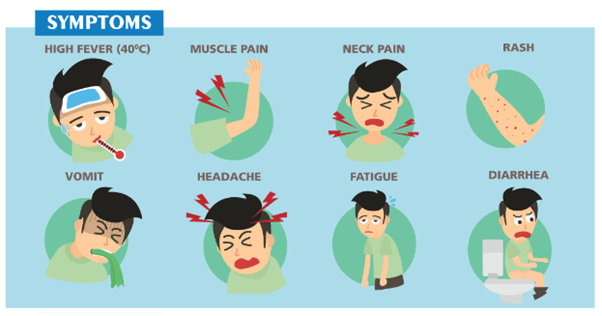
Suppose a person is infected with dengue for the second time with another subspecies, and if symptoms get severe, they are at risk of being infected with dengue hemorrhagic fever. It is a fatal infection requiring urgent medical care. The symptoms of severe dengue occur after 1-2 days of fever onset. Some symptoms are:
- Strong abdominal pain
- Fast breathing
- Restlessness, weakness, and fatigue
- Nose/ Gum bleeding
- Blood while throwing up or blood in stool.
Diagnosis and Treatment of Dengue Fever
The diagnosis of dengue infection can be done through a blood test. You can get tested for dengue at your nearest healthcare centre. The blood sample is taken from your body and sent to the laboratory to observe any signs of one of the four dengue viruses in your bloodstream. Typically, the platelet count in dengue fever decreases. The virus infects the blood cells and causes platelet damage.
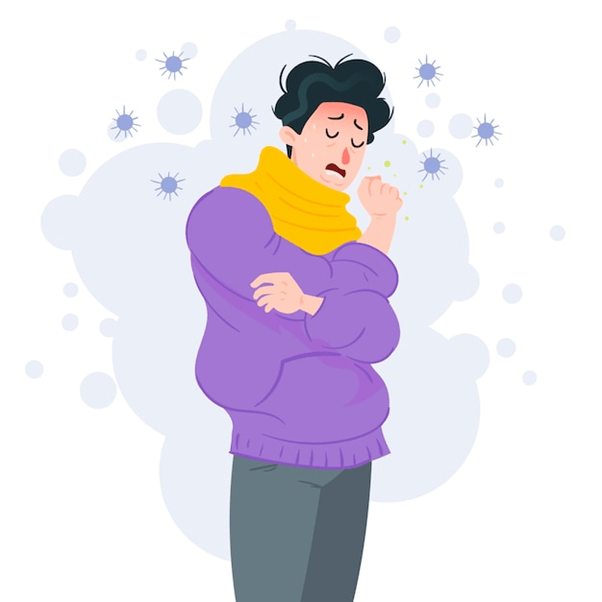
In the majority of cases, if someone gets diagnosed with dengue, the person can be treated at home with the help of some medicines. The doctor you are consulting might give you some advice to control the symptoms of dengue, such as:
- Drink plenty of water and consume liquids.
- Rest well
- Avoid taking aspirin or ibuprofen, as they can increase the chances of internal bleeding.
One of the most common medicines recommended for dengue is paracetamol. If you get diagnosed with severe dengue, then immediate hospitalisation or ER (Emergency Room) is recommended.
Preventive Measures
Most mosquitos that are infected with the dengue virus are active in the morning or daytime. The most effective way to prevent dengue infection is to avoid mosquito bites at any cost. Some of the ways to prevent the spreading of disease are:

- Wear full-coverage clothes to protect your skin from any exposure to mosquito bites.
- Get rid of still water around your residency, like rainwater buckets, where the chances of breeding mosquitoes are high.
- Always use mosquito repellents to prevent Aedes mosquito bites.
- Trusted vaporisers of mosquito nets while sleeping are also recommended.
Ongoing Trial on Vaccination
In India or globally, dengue disease is expanding everywhere. It has become the need of the hour to develop a vaccination against all four types of dengue virus (DENV-1,2,3,4).
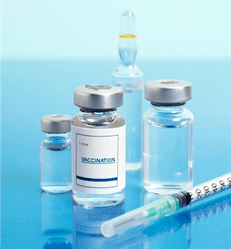
To develop the treatment and vaccinations for dengue, three vaccine prototypes were tested in India:
- Panacea Biotec, with the help of a US lab, developed the vaccination using weakened parts of all four serotypes of the dengue virus. The vaccine was tested on around 100 adults and discovered that the majority of people among them produced antibodies to combat all four types of dengue serotypes. Their next plan is to test the dengue vaccination on approx. 10,000+ people.
- With the help of weakened serotypes of the dengue virus, the second vaccination was made by the Serum Institute of India and the test was conducted on 60 adults of the age range 18-45 years and was safe so far. Phase 2 is set to conduct the test on children of the 2-18 year age range.
- Using the same technology, Indian Immunologicals Limited is also developing the dengue vaccine and started the phase-I trial on 90 healthy adults.These are not the only trials happening in India as other well-known institutions. Scientists are still working hard to prevent the expansion of dengue in India.
Conclusion
The adverse effects of dengue infection can be life-threatening as the infected mosquitoes split the viruses into the blood cells. Dengue fever can be cured with the help of some medications and precautions. The severe case of dengue requires instant medical care and a thorough understanding of the cause and symptoms.
With TopperLearning, gain informative insights about several diseases, their causes and other important topics. In view of NEP guidelines, we bring you carefully crafted online study materials for CBSE, ICSE, Maharashtra Board, JEE and NEET. Access them on the website and TopperLearning app to level up your exam prep.
TopperLearning is now on WhatsApp Channels!
Subscribe today by clicking the link and stay updated on the latest current affairs, study tips, our latest offerings and more. Click here
FAQ's
Q 1. What is the main symptom of dengue fever?
Ans: The main symptom of the dengue virus is a high fever that has flu-like signs and severe dengue can cause Abdominal pain, vomiting, and bleeding that requires a visit to the ER (Emergency Room).
Q 2. What kind of food helps to increase blood platelets in dengue fever?
Ans: Fruits like pomegranate, papaya leaves, orange, and fenugreek seeds can help in case of dengue fever.
Q 3. Which season causes most dengue cases?
Ans: The rainy or monsoon season causes an increase in dengue cases as mosquitos breed in water areas.
More from Education
Important Resources
- Education Franchisee opportunity
- NCERT Solution
- CBSE Class 9 Mathematics
- NCERT Solutions for class 10 Science
- Sample Papers
- CBSE Class 9 Science
- NCERT Solutions for class 10 Maths
- Revision Notes
- CBSE Class 10 Hindi
- CBSE Class 10 English
- CBSE Class 10 English
- CBSE Class 10 Social Studies
- CBSE Class 10 Science
- CBSE Class 10 Mathematics
- Career In Science After 10
- Career In Commerce After 10
- Career In Humanities/Arts After 10
- NCERT Solutions for Class 10
- NCERT Solutions for Class 11
- Business Studies Class 12 CBSE project





